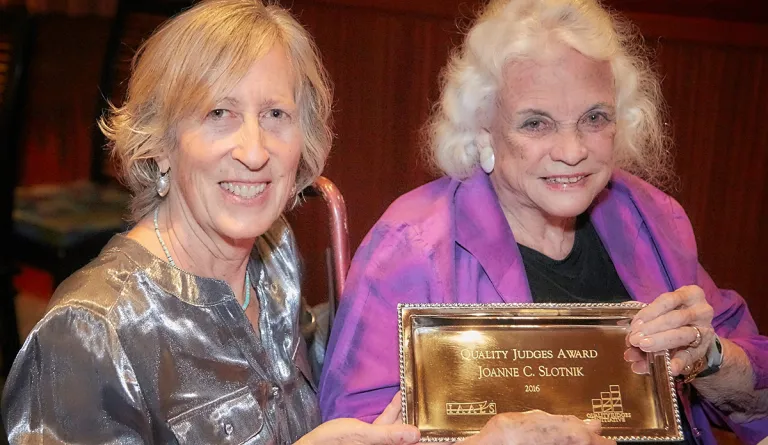Quality Judges Award Honors Best of Judicial Performance Evaluations Process

The Institute for the Advancement of the American Legal System (IAALS) is proud to announce Joanne C. Slotnik, Former Executive Director of the Utah Judicial Performance Evaluation Commission, as the inaugural recipient of IAALS’ Quality Judges Award in recognition of her contributions to preserving judicial accountability and impartiality. Retired U.S. Supreme Court Justice Sandra Day O’Connor, also Honorary Chair of IAALS’ O’Connor Advisory Committee to the Quality Judges Initiative, was on hand last night for the Phoenix event and award presentation.
“Utah’s independent and innovative judicial performance evaluation process is a national model of excellence and evolved largely under Joanne Slotnik’s guidance,” said IAALS Executive Director and former Colorado Supreme Court Justice Rebecca Love Kourlis. “The process by which Utah chooses, evaluates, and retains judges balances the need for fair and impartial courts with the need for public accountability and transparency, and is in the spirit of IAALS’ O’Connor Judicial Selection Plan.”
“Judges are unique public servants who must be immune to public pressure so that their decisions instill public trust,” explained Justice O’Connor. “Joanne Slotnik’s innovative work to ensure judicial accountability has helped Utah establish a healthy judicial system. For these reasons and more, she is the first person to receive IAALS’ Quality Judges Award.”
In the first eight years of the Utah Judicial Performance Evaluation Commission’s (JPEC) existence, Slotnik marshaled the efforts of 13 dedicated commissioners through a labor-intensive and fast-paced process. Under her leadership, the JPEC created surveys consistent with enabling legislation and developed a courtroom observation program that made innovative use of lay observers and procedural fairness concepts.
Her work demonstrates the importance of utilizing both quantitative and qualitative data for a credible judicial performance evaluation process. She also engaged in ongoing communications with JPEC stakeholders to address their concerns and perspectives.
In addition, Slotnik worked to address the challenge of evaluating Utah's many justice court judges by creating a tiered-structure that considers both weighted caseload data and attorney appearance data. Importantly, she also charted long-range plans for ensuring that the quality of JPEC's work continues to improve over time.
“As the Commission’s first director, I’ve tried to develop the tools judges need to continually improve. To the extent the Commission has succeeded, the judiciary and the people of Utah are the direct beneficiaries,” said Slotnik. “Receiving the first IAALS Quality Judges Award is so gratifying—and Justice O’Connor’s recognition of our work only heightens the honor. Utah is fortunate to have an exemplary judiciary, and I feel privileged to have had the opportunity to create a comprehensive evaluation program in such a supportive environment.”
The Quality Judges Award recognizes individuals and organizations that have made significant contributions to promoting models for choosing, retaining, and evaluating judges that preserve judicial quality and impartiality, ensure transparency and public accountability, keep politics from undermining the critical role of our judiciary, and inspire public trust in our courts. Recipients have made meaningful contributions toward advancing these goals, whether at the national or state levels.

